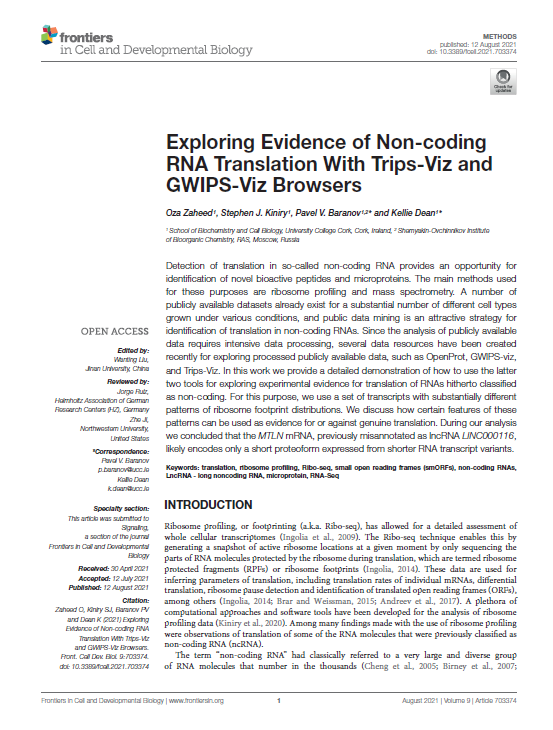CRT Cohort 2 student Oza Zaheed has recently published a paper entitled “Exploring Evidence of Non-coding RNA Translation with Trips-Viz and GWIPS-Vis Browsers” in the journal Frontiers in Cell and developmental Biology.
The paper focuses on recent research that non-coding RNAs contain sequences referred to as open reading frames that can lead to the production of a stable protein. Oza and colleagues explored the patterns of ribosome interaction within several non-coding RNA transcripts, using two computational/visualization tools, called Trips-Viz and GWIPS-viz, developed by Prof Pasha Baranov’s group at University College Cork. These tools allow users to discover new translation events in RNAs that previously classified as non-coding or lacking the ability to be used by cells for protein production.
Oza’s research focuses on the differential expression of long, non-coding RNA (lncRNAs) in various cancers. Analysis of these cancer-associated lncRNAs for open reading frames may lead to the discovery of novel bioactive proteins, which could potentially be used as diagnostic or prognostic markers, or as targets for therapies. The article provides a template for the manual curation of open reading frames on RNA transcripts to evaluate for translation and to infer the likelihood of protein production.
Speaking about some of the challenges of writing the paper Oza said:
“This area, although fascinating, was initially quite unfamiliar to me. Fortunately, my collaboration with Prof Pasha Baranov greatly helped to bolster my understanding of this exciting area of research. This spirit of information sharing and collaboration was also shared by his lab, who were always happy to help me learn how to best use their tools or to better understand the intricacies of this topic.”
Responses to the paper have been overwhelmingly positive with over 550 view in the first week alone. We look forward to further work from Oza who is further refining the methods of deciding which lncRNAs are differentially expressed in ovarian cancer and protein analysis of the lncRNAs with translated open reading frames. Achieving that, he would then like to extend his research to include breast cancer-associated lncRNAs.


